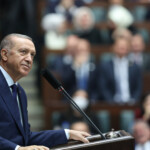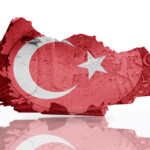Erdoğan’s instrumentalization of the state was crucial in attaining last night’s result. It will be nearly impossible for the opposition to successfully contest the election.
Turkish elections on Sunday, defined as “existential” for many reasons, will probably go down in the country’s history for showing not only Erdoğan’s invincibility, but also the chronic malaise of his opponents, unable to mobilize the masses in defense of what remains of Turkey’s democratic order.
Recep Tayyip Erdoğan, who has dominated the Turkish political stage for two decades, has once again thrown a curveball to those who had thought his time was up. Not only did he mantain his majority in Parliament, gaining around 320 seats out of 600, but he also only narrowly missed his crucial target: winning the presidential race in the first round. Erdoğan won 49.5% of the vote, leaving a margin of some 5 percentage points between himself and his rival, Kemal Kılıçdaroğlu, candidate of the six-party opposition block. This result caught nearly all observers by surprise, including even the most reliable pollsters in Turkey, who—apparently misled by the electorate—had tipped a victory for Kılıçdaroğlu and the alliance he leads.
Disappointment amongst the incredibly hopeful opposition parties, their elite backers and, especially, the voters quickly turned into a mixture of disillusionment, despair and rage. The trauma will reverberate for a long time, regardless of how loudly the opposition claims foul and manipulation.
In some ways, this is a repeat of the political screenplay that was staged in Turkey’s critical April 2017 referendum. That referendum handed Erdoğan a super-presidency by a narrow margin—one which granted him the power and authority to engineer a hard-core autocracy. The 2018 general elections also served as a dress rehearsal for the watershed election we saw on Sunday.
His playbook copy-pasted to an extent by Hungary’s Orban, Erdoğan has further devoured or demolished further the media, dismantled the rule of law, and abolished the practical separation of powers. Unchallenged by his Western allies, Erdoğan has kept nearly 40 thousand political prisoners (about 11 thousand of whom are Kurds and the rest Gülenists) and taken control of key autonomous state institutions like the Supreme Electoral Board (YSK). Several of the YSK’s judges were recently appointed by Erdoğan and have Imam school backgrounds. The Supreme Board of Television and Radio (RTUK), as well as the Directorate of Information Technology (BTK), are also under his control. Together, the constantly and closely monitor the Turkish media.
On Sunday, we saw the result of this level of domination; Erdoğan’s instrumentalization of the state was crucial in attaining the latest result. It will be nearly impossible for the opposition to successfully contest the election.
What differed from earlier elections this time was the deeper unreliability of the data inflow from polling stations and the role of two ministers. Until the attempted coup in 2016, Turkish elections always had multiple sources monitoring the vote counts. There had been at least four national news agencies that monitored each election, but with the state of emergency declared after the botched coup, Erdoğan seized or shut down all of them except for one loyal private agency and the major, semi-official Anatolian Agency (AA).
So: when the polls opened in Turkey early on Sunday, the only monitors were AA—which is claimed to be directly connected to the AKP—and its tiny, relatively dysfunctional rival, Anka Agency, whose data came from the opposition CHP’s network. The stage was therefore set for confusion. Conventional media—i.e. an equivalent of the New York Times or an impartial public broadcaster like the BBC—having been annihilated by Erdoğan, these two data sources continued to come into conflict with each other over the black hole where a truly independent media should have been.
The tiny segment of opposition channels became more and more frustrated, as both candidates for the vice presidency, Istanbul Mayor Ekrem Imamoğlu and Ankara Mayor Mansur Yavaş, accused AA of manipulation, but to no avail. On the pro-government media side, the show went on, until AA’s graphics settled at around 50% for Erdoğan and 43% for Kılıçdaroğlu. The rest of the night was occupied by a desperate opposition media staff and pundits complaining in an echo chamber.
The final word, of course, belonged to YSK, whose rulings were not appealable, and towards the end of the night, the YSK practically confirmed what AA had reported.
When Erdoğan soon after appeared on the famous AKP headquarters balcony, what his joyous supporters heard was the voice of confidence—a victor declaring that although the official result was yet to come, the path ahead was cleared.
In a nutshell, the entire choreography bore Erdoğan’s signature—a case study in how an autocrat plays his cards to consolidate power. And he seems to have payed the game perfectly: May 14 was the day his opponents learned that his rule may last a lifetime.
Meanwhile, the opposition had raised expectations to enormous heights. To them, the date would mean the democratic ouster of a quasi-dictator at the country’s centennial. Turkey would teach a lesson to the world, that it is possible to get rid of a despot through the vote—unprecedented in the political history of the world. They were proven wrong on a large scale.
There is still a silver lining for the remaining optimists within the opposition’s ranks. Can Erdoğan be beaten in spite of everything, on May 28? Here, again, realists and hopefuls may disagree. Partisan colleagues may continue to invest in a surprise victory for Kılıçdaroğlu, but the facts may again refute them.
First: Erdoğan dominates Parliament, which will embolden his voter base and send potential undecided votes to back him. Second: dismayed opposition voters, having lost hope, may not visit the ballot boxes in two weeks. Third: the tiny conservative components of the six-party opposition bloc, having gotten what they were after (a disproportionately high number of seats in parliament despite their low rankings), may also stay home in two weeks. Their pious, Sunni voters may have hesitantly voted for Kılıçdaroğlu—an Alevi—and they may now refrain from voting, or even vote for Erdoğan.
In short, these elections refresh Erdoğan’s power—at least in Parliament for the time being—and the overall constellation of MPs show a Turkey that shifts even further to the Far Right blend of Islamists and hard-core Nationalists. 2023 may go down in history as the breaking point: Turkey shifts further towards the east, alienating and disillusioning its ever-vulnerable, western-oriented, and secular segments—especially women and young people.
The views and opinions expressed above are the author’s and do not represent those of the Free Turkish Press.


